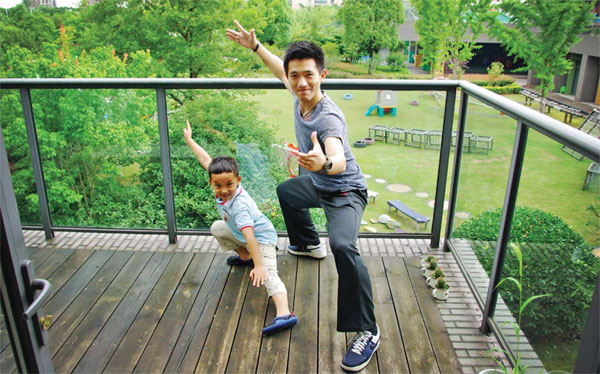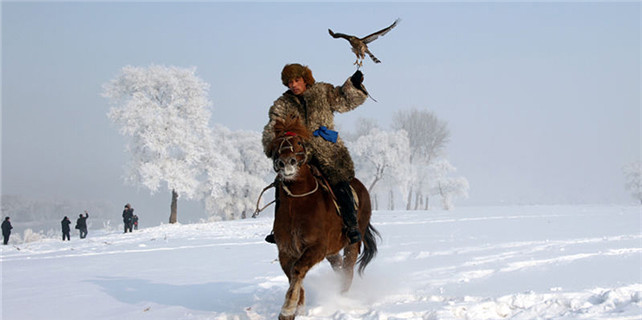Men needed for preschool class act
|
|
Drive to add more male teachers and avoid turning out 'timid boys' hampered by low salaries, social stigma
Gao Zhigang is a rarity in Chinese education circles: a male preschool teacher.
During his six years in the job, he says there has been a noticeable increase in men in kindergarten classrooms, but there are still hurdles to attracting more.
So are education officials, who have moved to act in recent years in the fear that Chinese schools are producing effeminate boys. They hope a more masculine presence can have an effect, but it appears there is still some way to go.
Despite relaxing the college admission requirements for men seeking to study preschool education, as well as offering scholarships that come with a guarantee of full-time employment, the number of men entering the field has remained low.
In Shanghai, for example, just 200 of the more than 53,000 teachers at 2,000 kindergartens were men in 2014, according to the city's education commission.
Industry insiders say the biggest hurdles are the general perception that teaching preschool is for women and the relatively low salaries that are offered to educators.
Chen Yilang, who works at the same kindergarten as Gao, says most people in his job earn about 55,000 yuan ($8,400; 7,500 euros) a year, which is roughly 10,000 yuan lower than the city average in 2014. More experienced teachers can earn up to 100,000 yuan.
"I didn't choose this job for the money; I chose it to be happy," he says. "But I do believe that it's important to change attitudes toward male preschool teachers, and for men to ignore such bias.
"Many of my peers have switched careers after just a few years because of the low income and high work pressure. Some have even faced difficulties in finding a girlfriend because of attitudes toward the profession."
Education experts believe the gender imbalance at preschools could have a serious social impact, as this stage of education can be critical to the forming of a young person's character.
Feng Wei, the principal of the China Welfare Institute Kindergarten, argues that the shortage of male teachers has led to an increase in boys who are shy and timid.
The typical family environment in China has also played a role, she says, as mothers are expected to raise the children while fathers bring home the bacon. Plus, because of the one-child policy, many children have grown up without siblings and tend to lead sheltered lives.
To address the problem, authorities need to focus on promoting respect, says Shi Bin, director of the Fundamental Education Development Center at Shanghai Normal University.
"The gender imbalance in preschool and primary school education may lead to girls growing up to be more 'powerful' than boys, who will lack confidence and be unable to tackle tough challenges," Shi says.
Parents are noticing, too, and some are already taking action to "toughen up" their sons by enrolling them in team sports and activities.
Zhu Yanjun, 35, has signed her two boys up for football, ice hockey and taekwondo classes. "I've noticed my 4-year-old is not good at sports or teamwork, since there are hardly any activities like that at the kindergarten," she says. "That's why I told him he has to play football, so that he can be strong."
China Welfare Institute Kindergarten has been recruiting male teachers since the late 1990s. Today, it has 25 men working alongside 100 female educators.
The distinct teaching methods employed by the male and female teachers "are a perfect complement" and help to provide children with a holistic learning experience, according to Feng.
Gao, for example, says he tries to reinforce "masculine qualities" through physical activities such as making students climb orange trees to pick the fruit.
"It helps to build their confidence and pride, things they can't learn from books," he says. "I prefer more direct and practical methods that teach information in a more interactive and vivid manner."
Wang Jiaming, another male teacher at the school, agrees that it is important to have a mix of male and female educators involved in a child's education.
"A female teacher can be a caring mother figure, while the male teacher can be a masculine figure, which can create a harmonious family atmosphere in a kindergarten," the 34-year-old says.
Chen adds that male teachers prefer to let children obtain physical knowledge and abilities through frequent sporting activities.
"I believe that being tough and having a strong team spirit is essential to a child's development," he says. "This is why I also design some family-friendly games to help parents, especially the father, to play a more pronounced role in their children's lives."
yuran@chinadaily.com.cn























